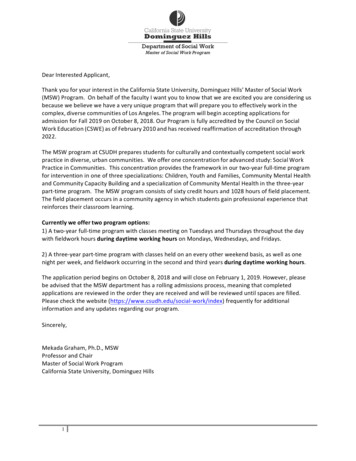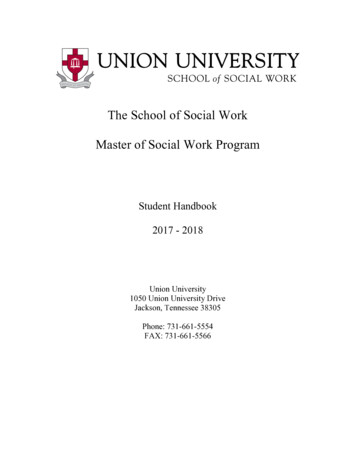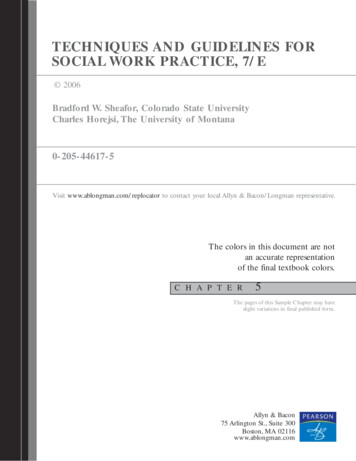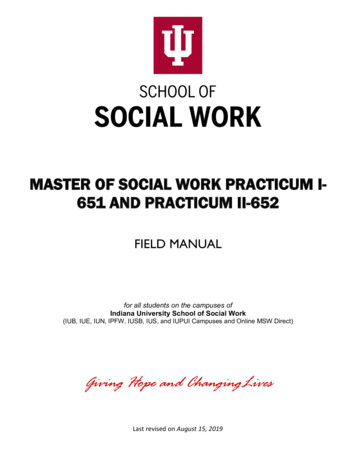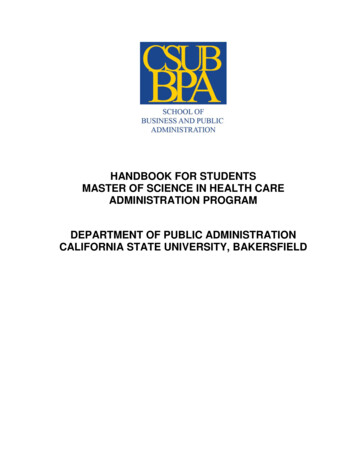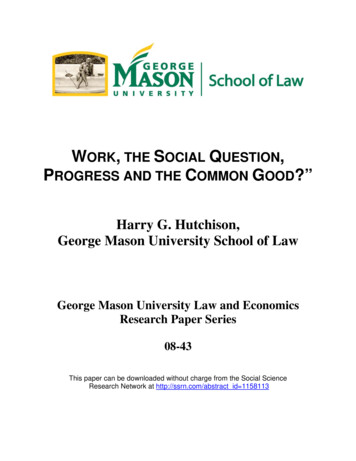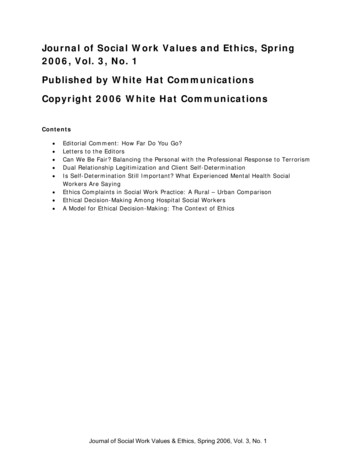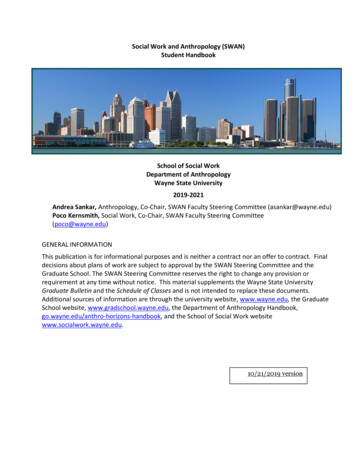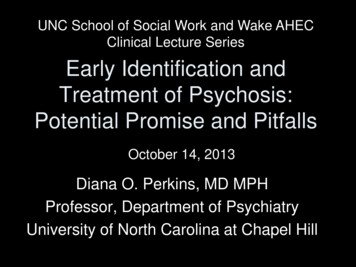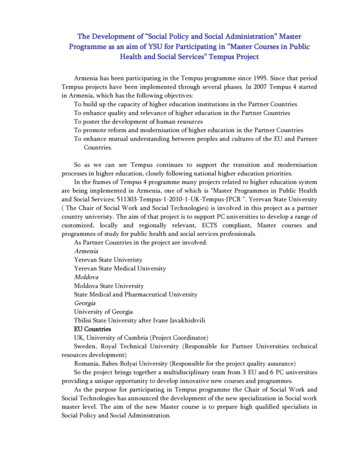
Transcription
The Development of “Social Policy and Social Administration” MasterProgramme as an aim of YSU for Participating in “Master Courses in PublicHealth and Social Services” Tempus ProjectArmenia has been participating in the Tempus programme since 1995. Since that periodTempus projects have been implemented through several phases. In 2007 Tempus 4 startedin Armenia, which has the following objectives:To build up the capacity of higher education institutions in the Partner CountriesTo enhance quality and relevance of higher education in the Partner CountriesTo poster the development of human resourcesTo promote reform and modernisation of higher education in the Partner CountriesTo enhance mutual understanding between peoples and cultures of the EU and PartnerCountries.So as we can see Tempus continues to support the transition and modernisationprocesses in higher education, closely following national higher education priorities.In the frames of Tempus 4 programme many projects related to higher education systemare being implemented in Armenia, one of which is “Master Programmes in Public Healthand Social Services: 511303-Tempus-1-2010-1-UK-Tempus-JPCR ”. Yerevan State University( The Chair of Social Work and Social Technologies) is involved in this project as a partnercountry univeristy. The aim of that project is to support PC universities to develop a range ofcustomized, locally and regionally relevant, ECTS compliant, Master courses andprogrammes of study for public health and social services professionals.As Partner Countries in the project are involved:ArmeniaYerevan State UniveristyYerevan State Medical UniversityMoldovaMoldova State UniversityState Medical and Pharmaceutical UniversityGeorgiaUniversity of GeorgiaTbilisi State University after Ivane JavakhishviliEU CountriesUK, University of Cumbria (Project Coordinator)Sweden, Royal Technical University (Responsible for Partner Universities technicalresources development)Romania, Babes-Bolyai University (Responsible for the project quality assurance)So the project brings together a multidisciplinary team from 3 EU and 6 PC universitiesproviding a unique opportunity to develop innovative new courses and programmes.As the purpose for participating in Tempus programme the Chair of Social Work andSocial Technologies has announced the development of the new specialization in Social workmaster level. The aim of the new Master course is to prepare high qualified specialists inSocial Policy and Social Administration.
So Yerevan State University is the FIRST in Armenia initiating the process of preparingthe high qualified specialists in social policy and social administration.The Discription of “Social Policy and Social Administration” MasterProgrammeThe Credit system is implemented at YSU since 2007-2008 academic year in all masterprogrammes, and since 2008-2009 academic year in undergraduate programs as well. Theshift to the new education system in HE was a result of requirements of Bologna process, andit aims to shift into student-centered education, when a student is in the center of educationprocess with his/her individual educational needs, priorities and capacities, and it gives anopportunity to implement individual education programs and flexible styles and modes oflearning.At YSU each master student has 1800 hours learning load annually, which is equal to 60ECTS ECTS. 1 ECTS credit is equal to 30 full hours (including in- and out of auditoriumhours).The length of academic year is 40 weeks, 32 of it are classes. The education process issplit into 2 semesters – fall and spring semesters. Each semester consists of 16 weeks ofclasses. Student’s weekly learning load can be maximum 45 hours, which is equal to 1.5academic ECTS.In order to get Master degree at YSU students have to gather 120 ECTS by the end ofmaster program, and his/her average qualitative score should be 12.00. Otherwise studentshould raise his/her advancement by means of repeating required number of courses in orderto receive the diploma.All students despite of their profession have to collect at least 6 ECTS in the frameworkof general education part and 48 ECTS in research part. The content structure of other ECTS(max 66) is defined through required and elective courses.All courses, included in Master program, have a final assessment, and the assessmentstructure is:The course is ended with 2 interim exams and 1 final exam. The format of those examsshould be suggested by the organizing Department and approved by the Dean.The score for certain course (education module) received at the end of semester isformed during the semester, including such components as:- Participation (maximum 2)- 2 interim exams (maximum 4 for each)- Final exam (maximum 10).The sum of those components composes the final score for each course.The Master programme of ‘’Social Policy and Social Administration’’ has to meet thesame requirements and demends presented in YSU Charter.Having the purpose of preparing specialists in social policy and social administration,students enrolled in “Social Policy and Social Administration” master programme study 4group of subjects:Required Professional Courses include the following courses: The History of SocialPolicy, Social Theories, Models of Social Management, Strategic Planning of Social Policy,
Social Risk Management, Social Welfare System of Armenia, Research Methods of SocialPolicy, Modern Armenian Social Policy, Social Policy and Social Work, Poverty and SocialInequality, Macropractice, European Social Policy, Psychology of Management, ProgrammeManagement.Additional Required Courses: English Language,The Issues of the Philosophy of theProfessionGeneral Courses: IT Technologies in the Professional Researches,The Modern Issues ofthe Profession.Elective Courses:Community Development/ The Theory of Development of Social StateSocial Partnership/Social RightSocial Welfare in the 2 world/ European Punitive Policy.Students of the new master course of “Social Policy and Social Administration” will havean opportunity to be enrolled in on-line course on “Social Welfare Policy in US and theSecond World”, which is organized by Yerevan State University and the University ofConnecticut (US), School of Social Work. The course also gives an opportunity forparticipating in students exchange programme. At the end of the course students will receivejoint certificate of Yerevan State University and University of Connecticut which verifiestheir participation and successful finish of the course.The Courses of “Social Policy and Social Administration” Master ProgrammeRequired Professional CoursesModuleLecturerSemes- ECTterS1. The History of Social PolicyMira Antonyan132. Social TheoriesLusine Karapetyan131313133.ModelsofManagementSocial Lusine Karamyan4.Strategic Planning of Social Vardan GevorgyanPolicy5. Social Risk ManagmentLusine Karapetyan6.Social Welfare System of RazmikArmeniaMartirosyan137.Research Methods of Social Artak KhachatryanPolicy238.ModernPolicy23ArmenianSocial Marine Yarmaloyan
9.SocialWorkPolicy10PovertyInequalityandandSocial Yevgine Vardanyan23Social Juliana Melkumyan2311 MacropracticeAnna Voskanyan3312 European Social PolicyMira Antonyan3313 Psychology of ManagementAnahit Sahakyan3314 Programme ManagementAnna Voskanyan33Additional Required CoursesModuleLecturerSemester ECTSEnglish Language-10The Issues of the Philosophy of theProfession-10General CoursesModuleLecturer1 ITTechnologiesinProfessional Researchesthe2 The ModernProfession.the NuneGeghamyanIssuesof-Semest ECTerS1313SemesterECTSSocial e CoursesModule1. Community Organization/State Development Theory2. Social Partnership/Social RightLecturer3 Social welfare in the countries of the Yarmaloyan/
second world/ European Punitive KhachatryanPolicyThe Syllabuses of Professional Courses of “Social Policy and SocialAdministration” Master ProgrammeThe History of Social Policy1st semester, 2 academic hours weekly, 3 ECTSThe goal of the course is to:Introduce students to the main stages of the development of social policy in Armeniaand abroad, the patterns/regularities and crisises, as well scientific-theoretical and ideologicalvalues, economic and legal, political and institutional basis which contributed to theformation of social policy.Learning OutcomesAt the end of the course the student will gain the following knowledge & skills:To understand the meaning of the “social policy” conceptTo know the main stages of social policy developmentTo understand the basis and development of social policyTo be able to analyze and bring out the links between the modern social policy systemsand approaches with the previous historical periodsBring into comparison the approaches applied in different stages of social policy withthe Armenia realityDevelop the mapping of social policy pictureAnalyze the causes of current social policy core problems.Content of the Course:Theme 1. The origins of social policy in the history of Europe and the worldTheme 2. Poverty in England and prevention measures: preconditions of law on povertyTheme 3. The evolution stages of social welfare policy in the USTheme 4. Modern Welfare Revolution in the USTheme 5. Social policy core crises and reformsTheme 6. Theory development on welfareTheme 7. Typology of welfare states in EuropeTheme 8. Social welfare initiatives and social services reformsTheme 9-10. Welfare and social policy in Armenia: from ancient times to our daysTheme 11. RA social policy in transformational stage: current situationAssessment methods and criteriaOut of 2 envisaged current examinations, first is launched in written form and thesecond – in the form of oral presentation. The maximum score for each examination is 4.Final exam
The final exam is oral: 10 score maximum. Questionnaire includes 3 questions: eachcorrespondingly 3 & 3.4 scores.Social Theories1st semester, 2 academic hours weekly, 3 ECTSThe goal of the course is to:Develop critical thinking skills in analyzing and comparing social theories. Thesetheories assist students in understanding persistent social conditions and problems that areparticularly relevant in social work practice.Learning OutcomesAt the end of the course the student will gain the following knowledge & skills: summarize and characterize the nature of social work theory and its relationship toother social sciences and the humanities; understand the importance of theoretical logic to social work in contradistinction tothe importance of social issues research and empirical findings; demonstrate their ability to think professionally by integrating several selectedclassical perspectives in the analysis of a contemporary social issue.Content of the Course:Theme 1. The nature of Social Work theories. Theme 2. Systems theory. Theme 3.Conflict theories. Theme 4. Theories of Empowerment. Theme 5. Theories of Assimilation,Acculturation, Bicultural socialization and Ethnic Minority Identity. Theme 6.Psychodynamic theory. Theme 7. Theories of Life Span Development. Theme 8. SymbolicInteraction. Theme 9. Phenomenology, Social Constructionism, and Hermeneutics. Theme10. Behaviorism, Social Learning and Exchange theory. Theme 11. Transpersonal theoryAssessment methods and criteriaOut of 2 envisaged current examinations, first is launched in written form, & the second– in the form of oral presentation. The maximum score for each examination is 4.Final examThe final exam is oral: 10 score maximum. Questionnaire includes 3 questions: eachcorrespondingly 3 & 3.4 scores.Models of social management1st semester, 2 academic hours weekly, 3 ECTSThe aim of this course is the development of master students’ basic competenciesregarding the management in social sphere. The course gives knowledge about main threemodels of social management and the peculiarities of managing organizations in socialsphere. The course units, such as “organizational structures and organizational behavior insocial services”, “management of social projects”, “decision making in social sphere”, “types oforganizations in social sphere”, help to develop students’ ability to analyze the organizationsof social sphere, develop a range of skills in the leadership of social services.Learning outcomesBy the end of the course students have to:- demonstrate deeper understanding of social management and its levels/functions,- differentiate 3 main models of social management,
- be able to explain the peculiarities of social sphere organizations, particularly themanagement of integrated services and interorganizational systems;- be able to deal with ethical dilemmas in social agencies,- differentiate organizational structures in organizations of social sphere,- develop organizational and leadership skills for organizing interdisciplinarycooperation,- develop professional skills for decision making process in state, private and nongovernmental social agencies.TopicsTopic 1: Social management: goals, objectives and main functions. Topic 2:Subordination as a model of social management. Topic 3: Coordination as a model of socialmanagement. Topic 4: Reordination as a model of social management. Topic 5: Levels ofdecision making process in social agencies. Topic 6: Managing interorganizational/integratedsystems. Topic 7: Organizational structures of social agencies. Topic 8: Psychological andsociological approaches to social relations in an organization. Topic 9: Main paradigms ininstitutional management in the frame of human services. Topic 10: Leadership as aneffective instrument for motivating and inspiring staff membersAssessmentStudents will have 2 interim exams (max 4 scores for each) and 1 final verbal exam. Thefirst interim exam is based on written test results, and the other one, which is verbal interimexam, is based on students’ personal social projects results. The final exam providesmaximum 10 scores.The final grading will consist of 4 parts.Strategic Planning of Social PolicyThe goal of the course is to:Give the students ideas about strategic management in general and about strategicplanning (programming) of the policy, conducted in the sector of Social Protection of RApopulation, and also establish practical skills for strategic programming, directed to thesolution of main problems of the sector.Learning outcomes1. Have theoretical knowledge of peculiarities of strategic management as the mostimportant level of public management, of theory, history and methodology of strategicplanning, of types of strategic programs, and also of strategic programs operating in publicregulation of RA Social Protection sector.2. Acquire the following professional practical skills: Experience in analyzing the general public policy and also the one, conducted invarious subsectors of Social Protection sector; Experience of comprehensive analysis of main problems of various subsectors of SocialProtection sector; Experience in analyzing the legal-legislative framework of public regulation of SocialProtection sector; Experience in analyzing the structural-functional peculiarities of institutionsoperating in Social Protection sector;
Experience in developing of strategic programs of policy, conducted at different levelsand in different subsectors of Social Protection sector, etc.Brief content of the course:The peculiarities of RA public management system and of the State as the mostimportant subject of public management process (2 hours);The strategic planning as the most important part of public management process,historical-theoretical approaches to strategic planning (2 hours);The essence and main objectives of “Social Policy” (2 hours);The structure and main problems of Social Protection of RA population as an object ofstrategic planning (2 hours);The role of strategic management of the sector in the provision of social security of theState (2 hours);The main directions of the policy, conducted in RA Social Protection sector, the maineffective strategic programs aimed at solving of main problems of various subsectors(2 hours);The methodology and technique of strategic planning and strategic analysis (2 hours).The program-targeting approach of strategic planning (programming) in publicmanagement processes (4 hours);The types of strategic programs. Targeting programs as the most important tool of thestrategic planning (2 hours);The peculiarities of monitoring and evaluation of the effectiveness of strategicmanagement programs (2 hours).Assessment methods and criteria:One of the two midterm examinations is conducted based on the assessment of student’swritten work and the other of oral presentation, with maximum 4 marks for each.Final examinationThe final examination is an oral examination with maximum 10 marks. The questionpaper consists of 3 questions with accordingly 3, 3, 4 marks.Social Risk Management1st semester, 2 academic hours weekly, 3 ECTSThe aim of the subjectSocial Risk Management Course covers the key terms, concepts, principles, models,phases, tools and techniques used in social risk management and provides students withuniversally applicable social risk management knowledge and skills.The expected resultsAt the end of course students can. Identify and assess social risks and analyse factors Know social risk skills, models, tools and techniques Design the strategic plan for the management of Social RisksCourse Content:Theme 1. Social Risk Management terms, concepts, principles. Theme 2. Types of socialrisks. Theme 3. The measures specifics of social risk. Theme 4. The consequences of socialrisks. Theme 5. The strategic planning of Social risk control. Theme 6. The mechanisms of
social risk management. Theme 7. The participants of social risk management process.Theme8. Social risk management process. Theme 9. Social protection as a social risk managementprocess Theme 10. Social risk management factors.Student knowledge assessing system.For assessing knowledge and professional skills acquired by students during studyingthis subject, students will pass final exam. Before the final exam they will also have to pass 2interim exams, one of which will be oral and based on their presentations and the next onein the written form. The maximum value of the interim exams will be 4 and for the finalexam 10.Social Welfare System of Armenia1st Semester, 2 Academic hours weekly, 3 ECTSThe purpose of the subject:The purpose of the subject is to study the social welfare system of Armenia and tounderstand the peculiarities of its organization and implementation. The aim of the subject isalso to justify the necessity of developing a new system of social welfare and to research thereforms which take place in current system. The students will also have an opportunity tostudy the legal bases of Armenian social welfare system and the social programs which areimplemented in the frames of that system.The expected results:After the successful finish of the subject it is expected that:students will have knowledge and information on Armenian social welfare system,they will know what kind of reforms are taking place in that systemwhat social programs are being implemented in the frames of the system.The topics of the subject:Topic 1.Introduction of the aims and purposes of the subject.Topic 2.Social welfaresystem of Armenia and its local and international legal bases. Topic 3. Social support systemin Armenia. Topic 4.Charity and humanitarian aid. Topic 5.Poverty and poverty familybenefits in Armenia.Topic 6.Social Insurance and social mandatory contributions inArmenia.Topic 7.Pension provision system in Armenia and current reforms of thatsystem.Topic 8.The social welfare system for people with special needs. Topic 9.The socialproblems of families, women, and children in Armenia and the methods of their resolutionin the frames of social welfare system.Student knowledge assessing system.For assessing knowledge and professional skills acquired by students during studyingthis subject, s
and Social Services: 511303-Tempus-1-2010-1-UK-Tempus-JPCR ”. Yerevan State University ( The Chair of Social Work and Social Technologies) is involved in this project as a partner country univeristy. The aim of that pr
